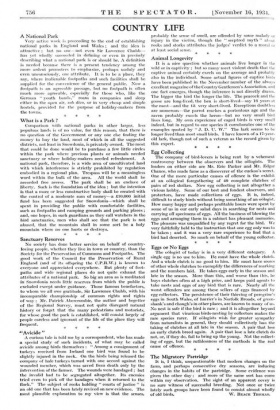Eggs or No Eggs
The oologist of today is in a very different category. A single egg is no use to him. He must have the whole clutch. And a whole clutch no good to him. He must have scores of other whole clutches to exemplify the differences of marking and the numbers laid. He takes eggs early in the season and late in the season. More than this, and worse than this, he buys clutches often at a high price, and keeps paid agents to take nests and eggs of any bird that is rare. Nearly all the worst offenders are among these sellers of eggs financed by egg collectors. The persistence of their thieving of peregrine's eggs in South Wales, of harrier's in Norfolk Broads, of green- shank's and chough's in other places, are known to many of us. No nest is safe if the bird is rare ; and it is altogether beyond argument that vicarious birds-nesting by collectors makes the rare species rarer. If oologists wish for greater sympathy from naturalists in general, they should collectively ban the taking of clutches at all late in the season. A pair that lose an early clutch breed again. A pair that lose a late clutch do not, or, if they do, fail to bring up the young. Not the collect- ing of eggs, but the ruthlessness of the methods is the real cause of offence.






































 Previous page
Previous page